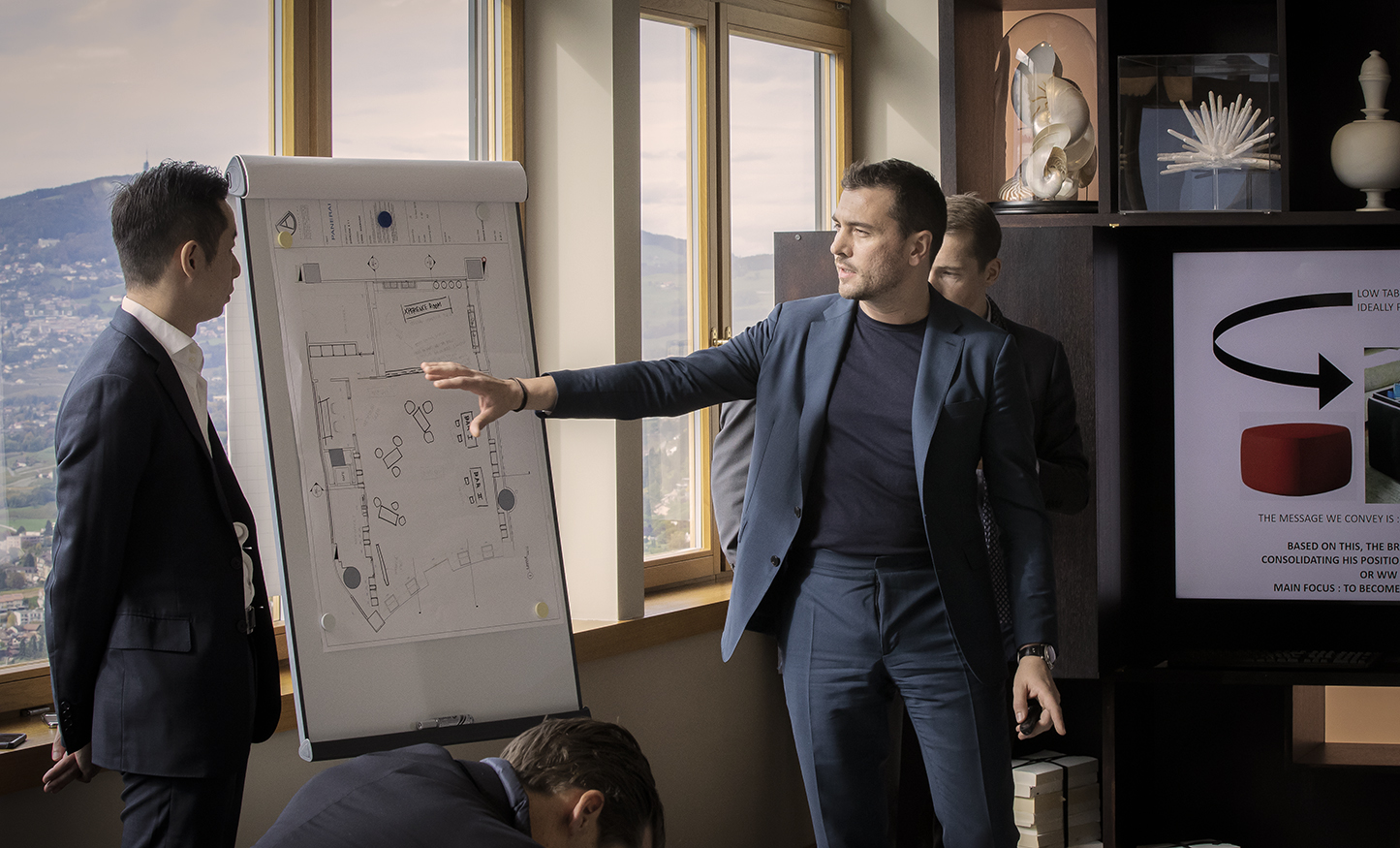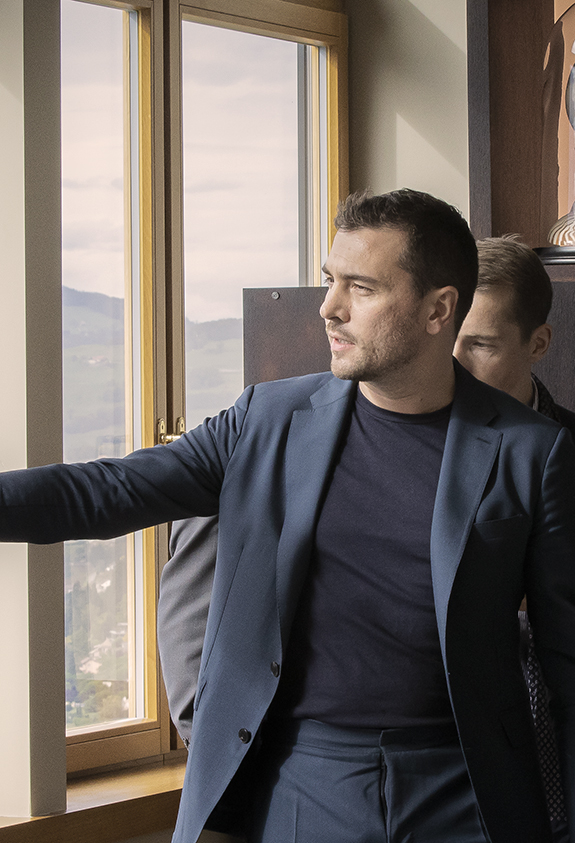


As luxury brands develop increasingly sophisticated online sales platforms, how does the luxury boutique remain relevant? Forwatchmaker Officine Panerai, the difference is the service excellence that is a distinguishing feature of luxury hospitality. Now Panerai is partnering with Glion on a unique training program to deliver hospitality-standard service excellence in store, as Gregory Leborgne, the company’s International Training Manager, explains…
Officine Panerai is among the world’s most desirable watch brands. Founded in Italy in 1860, it is today part of the Richemont luxury group, with headquarters in Geneva and watch manufacture also taking place in Switzerland.
The company has boutiques spread across the world, with a strong presence in Europe, Asia, the Middle East and North America. And it’s the management and staff of these boutiques who are the focus of a new training initiative that’s being spearheaded by the company’s International Training Manager, Gregory Leborgne.
These bespoke, week-long executive education programs were created in partnership with the Global Talent Development team at Sommet Education (Glion’s parent) and they have been delivered at Glion’s flagship campus, with instruction from expert Glion faculty.
Although face-to-face training initiatives such as these are temporarily paused, we spoke to Gregory to find out how the project has evolved to date, and what he feels the company’s sales professionals have gained from taking part.
Q: How did you come up with this idea to bring a hospitality ethos to high end retail?
Gregory Leborgne (GL): I have worked at Panerai for five years, but I’ve had 15 years in the watchmaking industry and 25 years in the luxury sector in general – all the time in the training department. During this time, I was very often confronted with sales teams, distribution networks, sellers and boutique managers in the context of training them for better commercialisation.
Throughout my time in luxury, I’ve seen the sector develop and grow significantly. Luxury brands have invested hugely in the quality of their products, and in their retail environments, which have become ‘luxury cathedrals’ that make their clients feel very special. More recently the focus turned to shop windows, which have become spectacular works of art. But what about the staff working in the boutiques, the service they provide and the relationships they build with the customers?
I asked myself these questions and realized that nothing significant had been done in this area since I started working in luxury. I have been in this business for many years, but no brand comes to my mind as a leader in the quality of service delivered consistently across all their boutiques.
Q: Why do you feel this is so important in the luxury arena?
GL: It’s because experiences are very important for the clients today; and everyone is talking about them. For me, experiences are directly connected to people’s emotions. I believe that if customers share their emotions with the sales employees when they visit the boutique, they have already had an experience they will remember. Why? Because emotions create memories, and this is what will determine if you will keep a good image of a brand with you when you leave the boutique
Q: Where does hospitality come into the picture for this?
GL: I asked myself: which business field offers the best service quality nowadays, and where can we find professionals who know how to offer exceptional experiences to their customers? And the industry that does this the best is hospitality. This is the field where – contrary to the luxury retail industry – you cannot buy a physical product and take it home. In luxury retail, even if the service was very bad, you will leave the boutique feeling fine because, in your hands, you will have the bag that you have been dreaming of. But if you go to a hotel and the service was bad, you will not take your bed home with you – you will just leave with a bad memory and the decision that you will not be going back. Thus, hospitality was the trendsetter for everything connected to customer relationship and creation of emotion when it comes to service.
I’ve already mentioned that this is not an area where my industry excels. Therefore, I realized that I would not find good service quality examples within luxury retail. Instead, we needed to learn from the field of hospitality, where there are true leaders in this area. This is how we got in touch with Glion and, together with the Global Talent Development team, we started looking into the possibilities of adding the hospitality element to Panerai brand, and to our boutiques, by further training our employees.
Q: When you presented this idea to the Panerai management, how did they react?
GL: They loved it! I presented my idea to the CEO, who immediately recognized the potential of this project and saw it as a logical step forward. It is true that, once we talk about the project to the people and other brands around us, it sounds like something so obvious to everyone. But nobody has actually thought of doing it before. Which is even more shocking if you believe that the luxury industry should be a leader and an example to the rest of the retail sector in all areas, but particularly in service quality.
Q: There have now been three training sessions at Glion – what has been the feedback from the boutique staff who’ve taken part?
GL: The participants love the idea, which you can see by how many people apply and how quickly the spaces get filled! We opened this opportunity to all the boutique managers in our worldwide network, who should then identify the employees in their teams who have the potential to do the training in the next stage. However, we did not want to send everyone to this training: we wanted to send people who have the right mindset. Therefore, we require everyone to do some preparation ‘homework’ in advance, to help us identify the boutique managers within our worldwide network who have the mindset of constant development and who are willing to learn more.
Q: It’s interesting that most of the workshops are not connected to retail at all – for example, some are focused on table arts and food presentation. Explain the thinking behind this?
GL: This is actually really important for us. When they arrive on campus, we tell participants that this is a week when they should completely forget about retail, watchmaking, luxury products or anything that is directly related to their day-to-day work. We explain to them that they will need to think out of the box, discover a different universe of hospitality and restaurant management, and learn from this field in order to apply new knowledge to their job when they go back.
Q: Did it take them some time to grasp this concept?
GL: When they undertake the Table Arts session with Chantal Wittmann, they initially tell us there’s no connection between selling a watch and setting up a table in a gastronomic restaurant. But then, they realize that there is more than they thought. An easy example: In every Panerai boutique, when a customer arrives, we take the time to serve them a real Italian coffee with an Italian mineral water on the side and some nice Italian chocolates and desserts. We do this in order to tell our story about the history of the brand and how it was all created in Italy.
However, today, our boutique employees no longer know why this is done: they simply follow procedure and serve the same things to all the clients, without telling the story. Therefore, when they do the Table Arts workshop with Chantal, they are reminded that each detail in their table presentation tells a story, and that there is much more behind a set-up of different products. They learn that some elements may appear secondary – it is true that the position of a fork on the table will not change the taste of food – but it will still contribute to the overall dining experience, so each detail has its importance and contribution.
Q: What outcomes have you seen from the first workshops? Have you seen things changing in the boutiques?
GL: We can see that all the participants have developed awareness when it comes to customer service; that they were impressed by what they have seen and that they loved the entire experience. We saw that they started questioning themselves and understanding that they have to challenge themselves and push the boundaries. What is interesting is that they also discovered the daily life of their clients and the type of service their clients generally experience. They realized that, when a customer comes out of a five-star hotel, he/she already received a superior quality of service, so if he/she goes from there directly to a Panerai boutique, they will expect the same treatment.
I believe that they learn a lot during the training, but the difficulty is to get them out of their comfort zone once they are back in their boutiques. They are all in their comfort zone, because they know very well the world of watchmaking, they know all about the Panerai brand; they know their daily environment very well and everything works well for them. This is what we are trying to make them understand: the way they sell works well for now, but it isn’t enough, and soon it will not be satisfying for the clients anymore. We need to do more. And this is where everything becomes more challenging.
Q: Do you think that other luxury brands might start looking to train people in customer experience using the techniques of the hospitality industry?
GL: Everybody is thinking about it, but when it comes to putting it into practice, it is much more complicated. This idea requires a lot of effort, investment and willingness to question the way we currently work. There are many actors in the world of luxury industry who are not ready to make the change. They find the idea attractive, but then they always go back to thinking: “why change something that generally functions?”.
This is a very commercial way of thinking: as long as the numbers are good, we will not ask questions nor try to change too much. But Panerai thinks differently: as long as the numbers are good, let’s use this valuable time to ask some important questions and evolve. Because, the day the numbers go bad, it will already be too late.
Q: Finally, we’ve noticed luxury brands starting to hire more people whose educational background is in hospitality. Is this the way Panerai wants to go as well?
GL: What will make a difference in the future, and what will make people go to the boutiques, is the education of the staff in those boutiques. Today, you find the same products online as those which are sold in boutiques. What is the advantage for a customer to take their car, go to the city centre, find a parking space etc, if there is no special benefit to it when compared to the online boutique?
And that benefit is the education. In front of the customers, there are people who are educated, not just in the product they are selling, but in communication, listening to the customer’s needs, attention to detail, empathy, and a willingness to provide exemplary customer service. What makes them come to the boutique is the search for a special connection with the brand and a special experience during purchase.
- We’d like to thank Gregory for his insights, and we look forward to resuming this initiative once restrictions on face-to-face learning are lifted.

















